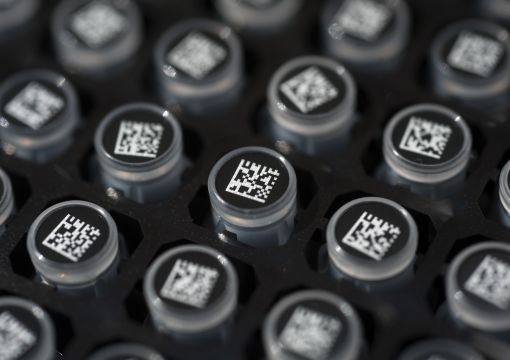Samples
All biological samples are safely stored under optimal conditions in our state-of-the-art storage facility of Lifelines, the Lifestore. The Lifestore was build and operates under high quality risk management procedures and has an automated system to organize up to 23 million samples. Our biological samples can be used for scientific purposes even after many years of storage.
In addition to safe storage of our samples, the Lifelines laboratory offers also a spectrum of sample collection, processing and analysis services. For additional sample collections we can assist in the development of sophisticated collection kits for on-site or even remote sample collection. We can process samples on our automated laboratory systems for other research project as well. This guarantees the same high standards as we demand for our own processes and samples. Our laboratory can offer DNA isolation and quality control procedures. Furthermore, part of the ‘Parelsnoer’ samples are stored in the Lifestore. If you want to apply for these samples, please submit an application via the Parelsnoer Institute.

Blood samples
The blood samples were collected in different blood tubes, namely citrate, heparine, EDTA, natriumfluoride and serum tubes with and without gel. Blood collected in heparine and natriumfluoride tubes have been used for analyses of clinical and haematological parameters, such as LDL/HDL cholesterol, HbA1c and triglycerides. The results of these analyses can be requested, but the samples are no longer available. The other tubes, such as citrate, serum tubes with and without gel and EDTA-tubes are present in large numbers and can be requested for research purposes. From the EDTA-tubes, both plasma and buffycoats were collected. The buffycoats were used for DNA isolation with the Qiagen Ultrapure. Part of the sample was normalized and stored at 4 °C, while the stock is kept at -80 °C. If DNA samples are requested, concentrations and 260/280 and 260/230 ratios will be joined with a release file.
Urine samples
In the hours before the blood was drawn, morning urine and 24h urine was collected for adults and overnight urine for children. This time path provides the possibility for correlation between blood and urine collection. Furthermore, from all participants a sample with ascorbine acid was stored.
Application and transport
Lifelines offers the samples from its state-of-the-art Lifestore. The samples you requested will be transported under tightly controlled conditions. All samples have unique numbers and have been pseudonymised. Once you have performed your analyses of the biological samples, Lifelines links the analysis results to the pseudonyms of the data you requested.
Sample processing
All our sample logistics and storage activities are carried out following standard operating procedures and we operate under a strict quality management system, using temperature monitoring, alarm systems, back-up freezers, redundancy of all essential infrastructure, and emergency backup generators. All operations and infrastructures are designed to handle samples with care, to use safe static storage, to know where and what the storage conditions are, to send out a notification when something is wrong, and to have a solution available. The majority of the samples is stored in our automated storage system, which has been built to protect the integrity of the samples. Even the picking of samples is done at -80˚C, ensuring the optimal quality of our samples.
We are happy to help you
Our Research Office will be happy to assist you in requesting the right biomaterials and the smooth execution of the issuing process. Both a project manager and a lab technician will be involved to ensure a prompt delivery of the requested samples. Lifelines has experience to deliver the needed samples worldwide and if needed to multiple sites.

